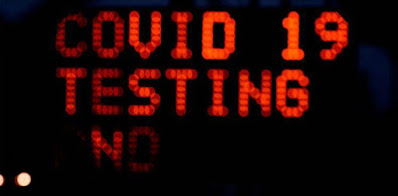Health experts warned Americans on Thursday that a rising tide of COVID19 cases, led by the Omicron variant, threatened major disruptions in their lives, from schools to shopping, and urged them to prepare now for a challenging month.
The United States had a record seven-day average of new cases, with more than 290,000 new infections reported daily, a Reuters tally showed.
According to the record, at least 18 states and Puerto Rico have set pandemic records for new cases. Maryland, Ohio and Washington, DC also saw record hospital admissions as U.COVID hospital admissions rose 27%.
The increase is due to an increase in vacation travel as New Years celebrations are yet to come and schools grapple with students returning to classrooms after the winter break.
“We will see the number of cases in this country rise so dramatically that it will be difficult for us to keep everyday life going,” said Dr. Michael Osterholm, an infectious disease expert from the University of Minnesota, told MSNBC.
“Next month is going to be a viral blizzard,” he said. “It is putting pressure on society as a whole. Dr. Anthony Fauci, the nation’s leading infectious disease official, said Wednesday that cases are likely to increase by the end.
” He and other U.S. health officials said early data shows Omicron appears less severe, but they have continued to push for vaccines, masks, and physical distance.
Services, schools and retailers among others in the coming weeks. “We have to be very careful not to underestimate Omicron too much,” said Dr. Peter Hoetz, an infectious disease expert at Baylor College of Medicine, told CNN.
It is also worrying that healthcare workers are being marginalized with their own COVID cases as well as less effective therapies, said Hoetz.
“We are at a pretty serious time. As early as early 2020, 825,663 people in the United States have died of COVID, the data showed, with the latest wave of hospital admissions for the unvaccinated being driven.
” President Joe Biden announced new news this month. plans to tackle the Omicron-powered wave, including federal reinforcements to hospitals and more testing, but some experts say it’s too little and too late.
So far, however, the economy appears to be stable, even if some economists are cautioned. While air traffic was largely disrupted and stores closed and events canceled in some troubled areas, other measures such as the Christmas sales were maintained.
The labor market is also holding up: the new applications for state unemployment benefits fell last week to the lowest level in the pandemic era, the Ministry of Labor announced on Thursday. small businesses, he said he expected the first week of January to be slower than Omicron’s forecast.
“The rest of January will likely depend on state and community health policies and epidemiological data,” Greenberg told Reuters. Keys, especially for working parents, with systems in Washington and New York promising to stay open with further testing.
Education Minister Miguel Cardona admitted the problem was staffing but urged schools to take measures to keep the children in classrooms. Unlike last year’s closings, “we now have better tools. They should stay open, ”he told MSNBC, adding that federal funding continues to be available to increase staffing levels and testing.
In the meantime, some universities have postponed their next semesters or have gone online. “We have light at the end of the tunnel,” said Osterholm. “But now you have to duck.

